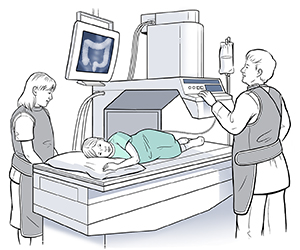A barium enema is an X-ray exam of the lower digestive tract (colon and rectum). This exam is used to find problems such as narrowing (strictures), blockages, or tissue growths (polyps). The exam uses a liquid (barium contrast) that makes organs show more clearly on X-rays. A barium enema takes about 30 minutes to 1 hour.
Before the exam
Your child’s colon may need to be cleaned out before the exam. But sometimes no special preparation is needed. Follow all instructions given by the healthcare provider. These may include:
-
Have your child drink only clear liquids 24 hours before the exam.
-
Give your child a laxative, a suppository, or enema the night before and on the day of the exam, as instructed by your healthcare provider.
-
Don’t give your child anything to eat or drink 4 to 6 hours before the exam.
-
Talk with your healthcare provider if any medicines need to be given during this time.
Note
For your child’s safety, let the technologist know if your child:
-
Has allergies to medicines
-
Has allergies to iodinated contrast material
-
Has any health problems
-
Has had surgery
-
Is pregnant or may be pregnant
-
Is taking any medicines
During the exam
A barium enema is done by a radiologist. This is a healthcare provider trained to use X-rays to test or treat patients. A radiology technologist may also help with the exam:
-
You can stay with your child in the X-ray room. You’ll be given a lead apron to wear for your safety. Pregnant women aren’t allowed in the X-ray room.
-
Your child lies on an X-ray table.
-
Movement affects the quality of the results. If your child can’t stay still during the exam, they may be held down. In rare cases, your child is sedated or given anesthesia (medicines to make your child relax or sleep). The healthcare provider will tell you more about this if needed.
-
The technologist first takes an X-ray of your child’s belly (abdomen).
-
Then your child lies on their side as the radiologist or technologist puts the tip of an enema tube into the rectum. Barium flows through this tube and fills the colon. Tape may be used to keep the enema tube in place. Air may also be injected through the tube.
-
Live X-ray images (fluoroscopy) are viewed on a screen as the barium moves through your child’s colon.
-
Your child may need to roll over, shift positions, or take deep breaths and hold them while X-rays are taken.
-
Once the enema tube is removed, your child can go to the bathroom if needed.
-
The radiologist may take final X-rays of your child’s empty colon before the exam is done.
After the exam
Here is what to expect:
-
Your child may need to return to the hospital the next day for more X-rays. This often happens if your child doesn’t have a bowel movement at the end of the exam.
-
Unless told not to, your child can return to their normal routine and diet right away. But make sure your child drinks plenty of water. Water helps relieve constipation that may occur after the exam.
-
Your child’s stool may look chalky white or light for 1 to 2 days due to the barium. If no barium is passed in 24 hours, call the healthcare provider.
-
The radiologist may discuss early results with you after the exam. A report is given to your child’s healthcare provider, who follows up with full results.
Helping your child prepare
You can help your child by preparing them in advance. How you do this depends on your child’s needs:
-
Explain that the radiologist will be testing the colon and rectum. Use brief and simple terms to describe the exam. Younger children have shorter attention spans, so do this shortly before the exam. Older children can be given more time to understand the exam in advance.
-
As best you can, describe how the exam will feel. There may be some cramping and mild pain. Your child may also feel the urge to use the bathroom during the exam.
-
Let your child ask questions.
-
Use play when helpful. This can include role-playing with a child’s favorite toy or object. It may help older children to see pictures of what happens during the exam.
Possible risks and complications
Possible complications from a barium enema include:
-
Allergic reaction (such as hives, itching, or wheezing) to barium
-
Constipation and bowel obstruction due to barium that hasn't left the body
-
Tear in the colon wall (rare)
-
Radiation exposure from X-rays
-
Reaction (such as headaches, shivering, and vomiting) to sedative or anesthesia
Featured in


